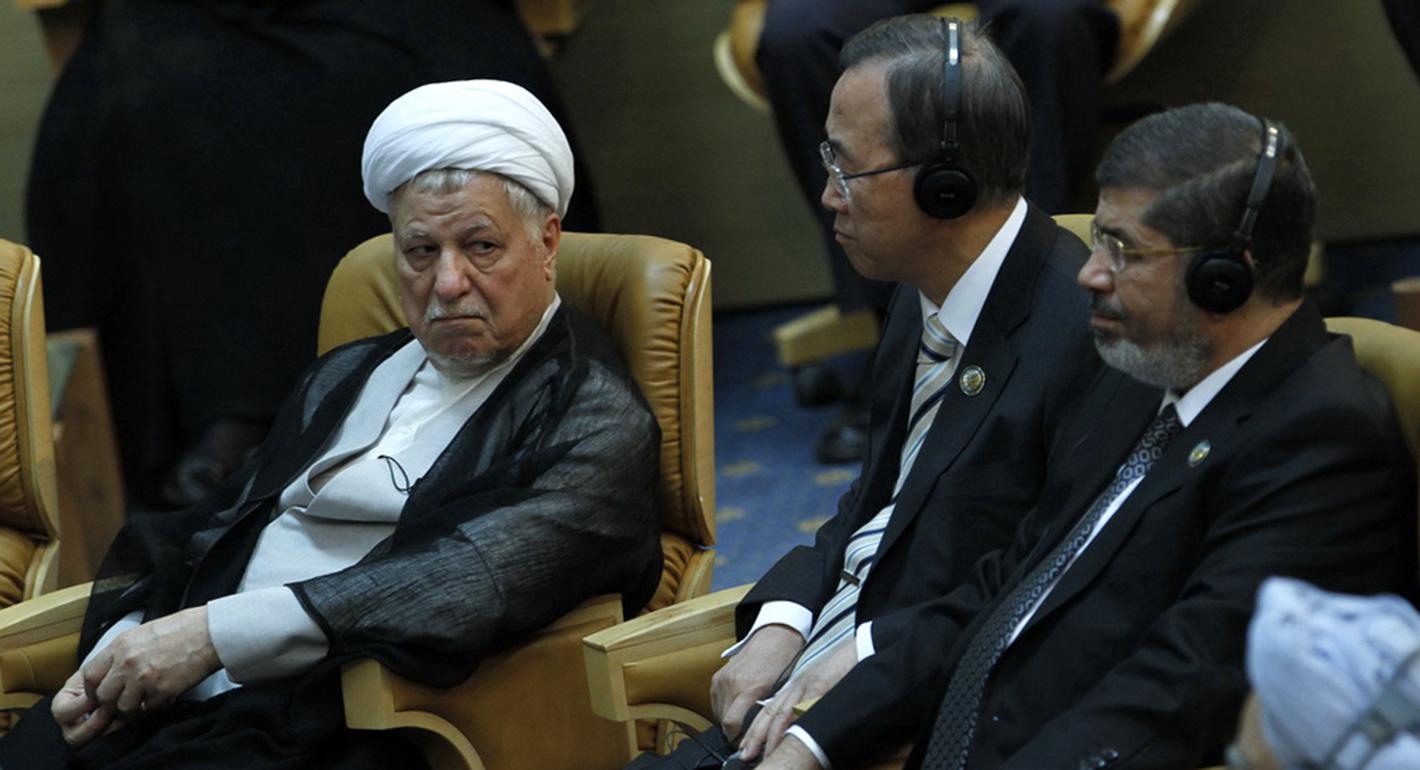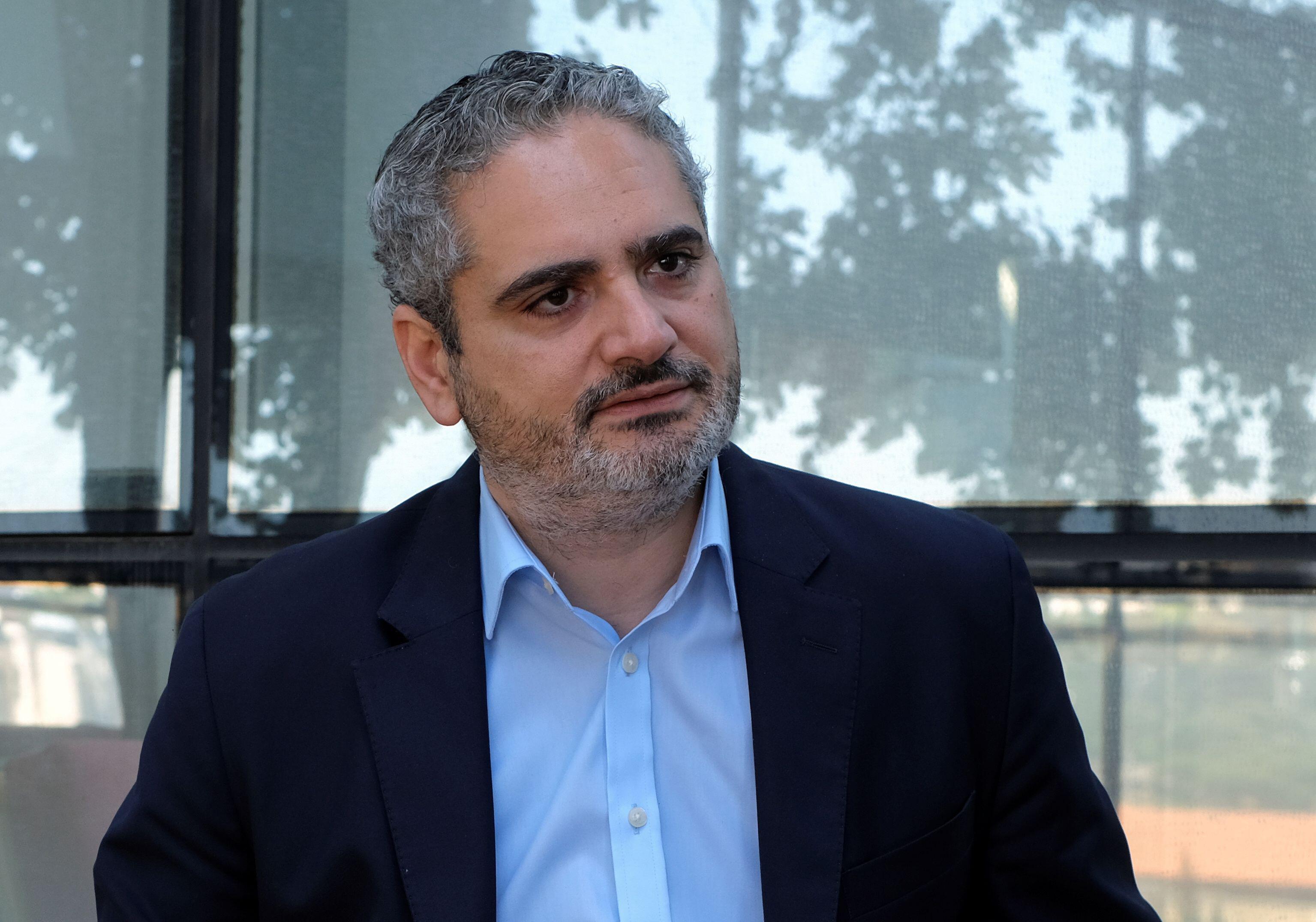A coalition of states is seeking to avert a U.S. attack, and Israel is in the forefront of their mind.
Michael Young
{
"authors": [
"Michael Young"
],
"type": "commentary",
"blog": "Diwan",
"centerAffiliationAll": "",
"centers": [
"Carnegie Endowment for International Peace",
"Malcolm H. Kerr Carnegie Middle East Center"
],
"collections": [],
"englishNewsletterAll": "",
"nonEnglishNewsletterAll": "",
"primaryCenter": "Malcolm H. Kerr Carnegie Middle East Center",
"programAffiliation": "",
"programs": [
"Middle East"
],
"projects": [],
"regions": [
"Egypt",
"Iran",
"North Africa",
"Middle East"
],
"topics": [
"Political Reform",
"Foreign Policy"
]
}
Source: Getty
In an interview, H. A. Hellyer explains the context of Egyptian-Iranian relations, which may be closer to normalization.
H. A. Hellyer is a nonresident scholar at the Carnegie Endowment for International Peace. He also serves as a senior associate fellow at the Royal United Services Institute for Defense and Security Studies in London, and as a Cambridge University fellow. His research focuses on geopolitics, security studies, political economy, and belief in the Middle East, the West, and Southeast Asia. Diwan interviewed Hellyer in mid-June to get his perspective on Egyptian-Iranian relations, at a time when the two countries appear to be moving closer to normalizing their ties.
Michael Young: Egypt and Iran seem to be drawing closer to normalizing relations. Can you describe, first, what divided them?
H. A. Hellyer: There is a long saga of complicated relations between Egypt and Iran, which saw the inheritors of two ancient civilizations (8,000 and 6,000 years old, respectively) engaging on different issues until the 20th century. The two monarchical families of Egypt and Iran intermarried, while there were conflicts when the political authorities and monarchies in both countries weren’t one and the same. The Arab nationalist Egyptian president, Gamal Abdel Nasser, clashed with the pro-United States, pro-Israel shah, Mohammed Reza Pahlavi.
All of this is prologue to the 1970s, when president Anwar Sadat’s government and the shah’s regime were quite close. But in 1979, Egypt signed a peace agreement with Israel, while the Iranian Revolution saw an end to Pahlavi rule in Tehran, after which Cairo granted refuge to the shah. In 1980, diplomatic relations between Egypt and Iran were cut, and the situation only worsened with Egypt supporting Iraq against Iran in their war during the 1980s, while Iran celebrated Sadat’s assassination in 1981. There are some further events if one wants to go into more detail, particularly during the immediate post-Hosni Mubarak revolutionary period in Egypt, when Iran appointed an ambassador to Egypt, and Egypt’s then president Mohammed Morsi visited Iran. But following Morsi’s overthrow in 2013, Egyptian-Iranian relations generally reverted to what they had been prior to this brief 2011–2013 interlude, which is to say that they were virtually absent.
To be clear, relations more recently weren’t harsh or deeply antipathetic. There’s often an assumption that because of Egypt’s close relations with different Gulf Cooperation Council states that are hostile to Iranian designs in the Gulf region, Cairo would naturally be antagonistic to Iran. Not particularly. Egypt’s relationship with Iran during this period was characterized neither by enmity nor friendship. Rather, it was as though the relationship had gone into cold storage, and was almost forgotten about.
MY: Did the Saudi-Iranian reconciliation play into the rapprochement between the two countries, and, if so, how?
HH: Saudi-Iranian reconciliation may have cleared the decks, in that it would be dubious for Egypt to consider warming relations with Tehran if Riyadh was deeply opposed. Cairo’s interest in normalizing relations with Iran would not compare to avoiding a massive rift with Riyadh. Moreover, all the signals are that Tehran has been taking the initiative on normalizing relations with Egypt, albeit with external, probably mainly Omani, intervention. It’s entirely in Iran’s interest to normalize with as many parties as it can in the wider Middle East, after all. The Iranian economy is in a precarious state, so it could use more trading partners. Its regime faces a great deal of dissent (though it clearly has staying power). And Israel has openly normalized with several Arab states in recent years. The relative reconciliation between Iran and Saudi Arabia created a certain momentum on the one hand in Tehran, but also meant that a Saudi Arabian objection to Egypt would be absent, even if Cairo was not terribly interested in taking the lead. Indeed, until now, Cairo has been standoffish about rapprochement, although privately Arab diplomats are confirming there is interest.
MY: We know that Iran had good relations with Egypt’s Muslim Brotherhood, even if the late Egyptian president Mohammed Morsi, who was a member of the Brotherhood, was unable to translate this into renewed diplomatic ties. How might normalization with the regime of President Abdel-Fattah al-Sisi, who overthrew Morsi, affect Iran’s relationship with the Brotherhood?
HH: It’s an interesting tidbit of history that Gamal Abdel Nasser, who opposed and repressed the Muslim Brotherhood, is claimed to have funded, during the 1960s, Ayatollah Ruhollah Khomeini, who eventually established a theocracy in Iran. Alliances change and shift, and it was during the period of direct military rule by Egypt’s Supreme Council of the Armed Forces in 2012, following the revolutionary uprising that overthrew Mubarak, that Iran appointed an ambassador to Egypt, and subsequently that Morsi visited Tehran. Egypt never sent an ambassador to Tehran, however, and relations were later downgraded. But the Muslim Brotherhood would not really be an issue if the countries normalized. Little would change in Tehran when it comes to Iran’s relationship with the Brotherhood per se as a direct consequence of the normalization of relations. The Brotherhood’s political fortunes regionally would have more impact in this regard.
MY: How does the United States feel about a rapprochement, given that until the Saudi-Iranian reconciliation Washington appeared to be seeking to put together a coalition of Arab countries, bolstered by Israel, to contain Iran?
HH: The United States would not be particularly enthusiastic, of course. Iran has no friends in Washington, understandably so, considering its regional and domestic record. America is generally split between those who seek to contain Iran aggressively and those who seek to minimize Iran’s damage without escalation. However, apart from a small fringe, I don’t think there are many keen to empower Iran’s position in the region. Having said that, I don’t know if Washington will really see a relative Egyptian-Iranian rapprochement as genuinely changing the balance of power in any way. The absence of Egyptian-Iranian normalization didn’t mean a massive deal, so I’m not sure we should assume the presence of normalization would mean a massive deal either.
MY: How do you anticipate that the relationship between Egypt and Iran will develop, especially on the security level, and particularly what do you think will be Israel’s reaction?
HH: Some assume that Egypt, with its deep connection to Sunni Islam historically as well as being the home of Al-Azhar, and Shia Iran might necessarily have bad relations. It’s a bit ironic, because it was in Egypt where one of the more contemporary efforts at a semblance of modern Sunni-Shia rapprochement took place, from the 1940s onwards. An Iranian cleric sent to Cairo by Ayatollah Hussein Borujerdi, a famed Iranian Shia authority, set up a noted association for Sunni-Shia dialogue, and Al-Azhar’s grand imam in 1958 issued a religious verdict arguing that practicing according to Twelver Shia jurisprudence was permissible. Although this was quite controversial, Al-Azhar’s leadership has consistently upheld Sunni-Shia amity, which was a part of the 2005 Amman Message on sectarianism, along with other statements since. So, on a cultural level, there might well be positive developments. Egyptians on a popular level might be unimpressed with Tehran’s approach to Syria and the Assad regime, but with recent steps in the Arab world to normalize with Damascus, I doubt this would be expressed much.
On a security level, I’d be surprised to see much in the short to medium term. Egypt’s security architecture, regionally speaking, does not depend on Iran’s participation, and I’m not sure how it would become such considering Cairo’s other relationships. Nevertheless, Israel would have a lot of antipathy for this latest development. The Israelis were looking forward to a Sunni-Arab-Israeli coalition against Iran. Now, Riyadh has deescalated. Others in the Gulf region are also looking at how to engage with Tehran. Even in Washington itself, the bipartisan consensus around supporting Israel is breaking down. Within the Democratic Party in particular, there is far harsher criticism of Israel, partly due to the new far-right Israeli government, and partly because of the growing influence of the progressive wing of the party. None of this looks great for Israel.
Carnegie does not take institutional positions on public policy issues; the views represented herein are those of the author(s) and do not necessarily reflect the views of Carnegie, its staff, or its trustees.
A coalition of states is seeking to avert a U.S. attack, and Israel is in the forefront of their mind.

Michael Young
The country’s leadership is increasingly uneasy about multiple challenges from the Levant to the South Caucasus.

Armenak Tokmajyan
In an interview, Shahla al-Kli discusses the country’s parliamentary elections and what they reveal.
Rayyan Al-Shawaf
Ankara may seek to annul a maritime deal with Cyprus and expand its influence in the next parliament.

Mohanad Hage Ali
Recent election results have placed Nouri al-Maliki in a strong position to name the next prime minister.
Wladimir van Wilgenburg